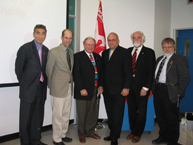Global warming needs global learning
Global warming needs global learning McGill University
User Tools (skip):
Global warming needs global learning

Some of the world-class scientists who participated in the Macdonald Centenary Symposium included Rickey Yada, University of Guelph; Wes Warren, Washington University; Bert Drake, Smithsonian Environmental Research Center; Arthur Ragauskas, Georgia Institute of Technology; Gordon Young, UN Water Assessment Program; and Don Smith, Chair of McGill's Plant Science Department.
HCR PHOTO
The most powerful tool available to combat global warming is not being used adequately, according to a panel of world-class environmental scientists. That tool is education. Without more education and public awareness the threat of global warming will not be adequately addressed, experts agree.
Six experts in fields such as water management, biofuels and animal-borne viruses (such as West Nile and Monkey Pox) were invited to Macdonald Campus on Nov. 3 for the symposium "A Biorevolution in the Next 100 Years," organized by Don Smith, James McGill Professor and chair of the Plant Science Department. The goal of the Macdonald Centenary Symposium was to look ahead to the environmental research challenges of the next 100 years.
Francis Scarpaleggia, MP for Lac Saint Louis, who sits on the federal Environment Committee, attended the afternoon sessions. Also present were Provost Anthony Masi, Denis Thérien, Vice-Principal, Research and International Relations, and Chandra Madramootoo, dean of the Faculty of Agricultural and Environmental Sciences.
Scientists and environmentalists should focus their efforts on the younger generations, said Dr Bert Drake, a plant physiologist at the Smithsonian Environmental Research Center in Maryland. "After 9/11, there was a huge change in the sensitivity of young people in the United States to the need to consider global problems and not just our own."
Drake demonstrated with graphs how the planet had been in a cooling trend during the past 10,000 years. The temperature took a surprising turn for the worse around 1900 and began rising steadily. That rise is consistent with rising CO2 levels during the industrial revolution.
Glaciers melt, reserves shrink
The most immediate and pressing consequence are melting glaciers, Drake said. One-sixth of the world's population relies on drinking water from melting glaciers during unusually dry seasons. (The meltwater feeds rivers and streams.) As glaciers melt, this important water reserve is shrinking.
As the world population becomes more urban, several cities are straining to cope with the increasing demands for water. "Many water situations are really a crisis in governance," said Gordon Young, former coordinator of the United Nations World Water Assessment Programme, who did his graduate studies at McGill in physical geography with specialisation in glaciology. Young is known worldwide as one of the foremost experts on glaciers.
Tourism's demands
Young presented the scientific findings of the UN's Second World Report on Water. While the problems are global the answers must be considered locally, he said. Often the hardest-hit regions have neither effective institutions nor legislation to deal with issues of availability and access to safe water.
Then there are the economic considerations. Tourism, while good for local economies, can also be bad for the locals. "Very often the tourists put great demands on the water resources," Young said. "They want their golf courses and their swimming pools and very often that's in nice warm countries where there is not much water in the first place."
Can we combat these global threats? Three big problems stand in the way, Drake said. First, it's convincing the naysayers. And that is where better education comes in. Secondly, research must be supported enthusiastically, giving as an example the McGill-led national Green Crop Network. "We need more exploration," Drake said. "I don't think we can fully imagine what the solutions are going to be fully at this time." Finally, what is needed is a political structure determined to confront the issue. Drake said the Kyoto accord is flawed because it exempts China and India. Stronger political leadership will come only with a more vocal, more informed public, he said.
He ended with a quote from Winston Churchill: "You can always trust America to do the right thing ... after having exhausted all other possibilities."

